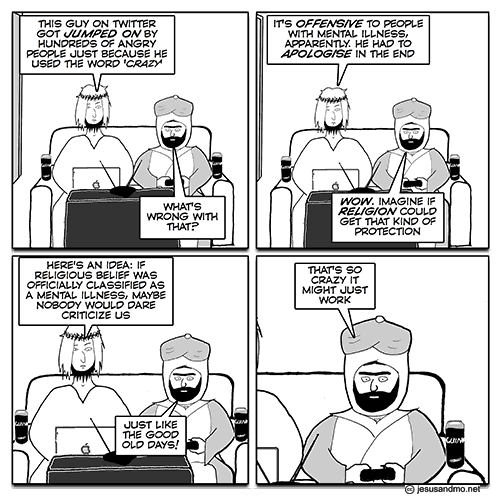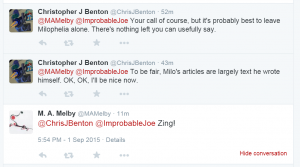The Temple Grandin chapter of An Anthropologist on Mars was originally an article in the New Yorker.
Kanner and Asperger had looked at autism clinically, providing descriptions of such fullness and accuracy that even now, fifty years later, they can hardly be bettered. But it was not until the nineteen-seventies that Beate Hermelin and Neil O’Connor and their colleagues in London, trained in the new discipline of cognitive psychology, focussed on the mental structure of autism in a more systematic way. Their work (and that of Lorna Wing, in particular) suggested that in all autistic individuals there was a core problem, a consistent triad of impairments: impairment of social interaction with others, impairment of verbal and nonverbal communication, and impairment of play and imaginative activities. The appearance of these three together, they felt, was not fortuitous; all were expressive of a single, fundamental developmental disturbance. Autistic people, they felt, had no true concept of, or feeling for, other minds, or even of their own; they had, in the jargon of cognitive psychology, no “theory of mind.” However, this is only one hypothesis among many; no theory, as yet, encompasses the whole range of phenomena to be seen in autism.
The article was published in December 1993; there’s doubtless been a lot more research on autism in those 22 years.
He went to meet Grandin at Colorado State University, where she was an assistant professor in the Animal Sciences Department.
She sat me down with little ceremony, no preliminaries, no social niceties, no small talk about my trip or how I liked Colorado. Her office, crowded with papers, with work done and to do, could have been that of any academic, with photographs of her projects on the wall, and animal knickknacks she had picked up on her travels. She plunged straight into talking of her work, speaking of her early interests in psychology and animal behavior, how they were connected with self-observation and a sense of her own needs as an autistic person, and how this had joined with the visualizing and engineering part of her mind to point her toward the special field she had made her own: the design of farms, feedlots, corrals, slaughterhouses—systems of many sorts for animal management.
She talked rather relentlessly, and after an hour he had to stop hoping she would offer him coffee and just say he needed some.
There was no “I’m sorry, I should have offered you some before,” no intermediacy, no social junction. Instead, she immediately took me to a coffeepot that was kept brewing in the secretaries’ office upstairs. She introduced me to the secretaries in a somewhat brusque manner, giving me the feeling, once again, of someone who had learned, roughly, “how to behave” in such situations without having much personal perception of how other people felt—the nuances, the social subtleties involved.
Later they had dinner, then went for a walk.
What, I wondered as we walked through the horsetails, of Temple’s cosmogony? How did she respond to myths, or to dramas? How much did they carry meaning for her? I asked her about the Greek myths. She said that she had read many of them as a child, and that she thought of Icarus in particular—how he had flown too near the sun and his wings had melted and he had plummeted to his death. “I understand Nemesis and Hubris,” she said. But the loves of the gods, I ascertained, left her unmoved—and puzzled. It was similar with Shakespeare’s plays. She was bewildered, she said, by Romeo and Juliet (“I never knew what they were up to”), and with “Hamlet” she got lost with the back-and-forth of the play. Though she ascribed these problems to “sequencing difficulties,” they seemed to arise from her failure to empathize with the characters, to follow the intricate play of motive and intention. She said that she could understand “simple, strong, universal” emotions but was stumped by more complex emotions and the games people play. “Much of the time,” she said, “I feel like an anthropologist on Mars.”
That put her at a disadvantage with people, but over the years she built up what she calls a library of experience, which helps her be less vulnerable to cheaters.
In one plant she had designed, she said, there had been repeated breakdowns of the machinery, but these occurred only when a particular man, John, was in the room. She “correlated” these incidents and inferred at last that John must be sabotaging the equipment. “I had to learn to be suspicious, I had to learn it cognitively. I could put two and two together, but I couldn’t see the jealous look on his face.” Such incidents have not been uncommon in her life: “It bends some people out of shape that this autistic weirdo can come in and design all the equipment. They want the equipment, but it galls them that they can’t do it themselves, but that Tom”—an engineering colleague—“and I can, that we’ve got hundred-thousand-dollar Sun workstations in our heads.” In her ingenuousness and gullibility, Temple was at first a target for all sorts of tricks and exploitations; this sort of innocence or guilelessness, arising not from moral virtue but from failure to understand dissembling and pretense (“the dirty devices of the world,” in Traherne’s phrase), is almost universal among the autistic.
Whereas we “normal” people know all about dissembling, as victims and as perps. Do it to them before they do it to you.
Then he gets to the part about how her autism enables her to understand animals.
…we drove out to the university’s experimental farm, where Temple does much of her basic field work. I had earlier thought there might be a separation, even a gulf, between the personal—and, so to speak, private—realm of her autism and the public realm of her professional expertise. But it was becoming increasingly clear to me that they were hardly separated at all; for her, the personal and the professional, the inward and the outward, were completely fused.
“Cattle are disturbed by the same sorts of sounds as autistic people—high-pitched sounds, air hissing, or sudden loud noises; they cannot adapt to these,” Temple told me. “But they are not bothered by low-pitched, rumbling noises. They are disturbed by high visual contrasts, shadows or sudden movements. A light touch will make them pull away, a firm touch calms them. The way I would pull away from being touched is the way a wild cow will pull away—getting me used to being touched is very similar to taming a wild cow.” It was precisely her sense of the common ground (in terms of basic sensations and feelings) between animals and people that allowed her to show such sensitivity to animals, and to insist so forcefully on their humane management.
One more passage:
I was struck by the enormous difference, the gulf, between Temple’s immediate, intuitive recognition of animal moods and signs and her extraordinary difficulties understanding human beings, their codes and signals, the way they conducted themselves. One could not say that she was devoid of feeling or had a fundamental lack of sympathy. On the contrary, her sense of animals’ moods and feelings was so strong that these almost took possession of her, overwhelmed her at times. She feels she can have sympathy for what is physical or physiological—for an animal’s pain or terror—but lacks empathy for people’s states of mind and perspectives. When she was younger, she was hardly able to interpret even the simplest expressions of emotion; she learned to “decode” them later, without necessarily feeling them.
That’s only about halfway through. It’s a magnificent article.










